Anatomy of an Era: Bryan Pruitt Part 2
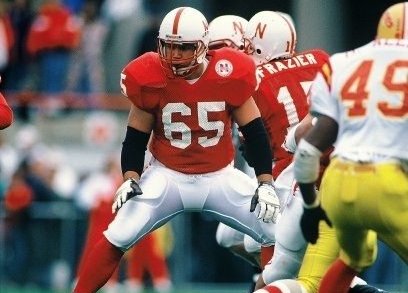
Excerpted from Chapter 3, No Place Like Nebraska: Anatomy of an Era, Vol. 1
Bryan Pruitt Part 2
Walk-on, Offensive Guard, Midlothian, Illinois (St. Laurence)
Continued…..
Author: Bryan, let’s continue talking about Coach Osborne…
Bryan Pruitt: Sometimes you’d try to make a name for yourself in practice and you’d get into a fight with Jason or Christian Peter… and he wouldn’t tolerate that. He’d send you to running the stadium stairs. He always said, ”If you can’t control yourself in practice, how are you going to do it in a game?”
The other thing was that old commercial, “When E.F. Hutton talks, people listen.”? Whenever he would walk into a room everyone would shut up, and no one would disrespect him by talking. Whenever he was in your presence you were on your toes. Guys wanted to hear what he had to say.
You’d come in on Monday morning and he’d have the game film broken down already, what our goals were, what we did last week. We had at least 25 goals that we were trying to achieve each week. I think he got a bad rap -especially after Lawrence Phillips- you heard people say that all he wanted to do was win and that Lawrence came back for that. Well, I think it was just the opposite. The only thing he cared about were his guys -the guys in the room- making sure they were going to school, making sure they were taking care of their family and just getting better. I think the winning for him was secondary.
And if you remember, we had about 200 guys around on the team then. In ‘90 they had freshman ball, and then ‘91 we still played a couple of JV games. I’m thinking there were 90 freshmen on the freshman team, 75 to 90, if I recall. My sophomore year I started a couple of JV games, I picked up a fumble against Air Force and went about 40 yards. I don’t even remember half those teams we played, I’d have to look at a schedule or something. But I think there were something like 150 guys on the varsity while we were over there at the North Stadium locker rooms.
Q: When did you move over to the South Stadium locker room with the varsity?
BP: I’m thinking that was probably spring of ‘92 or ‘93 was when I moved over. I remember when I first got on, I think we were 7 deep at each position on the offensive line.
Q: No wonder Milt Tenopir didn’t have much time to spend with you, huh?
BP: He just had to get the guys ready. That was a big part of it.
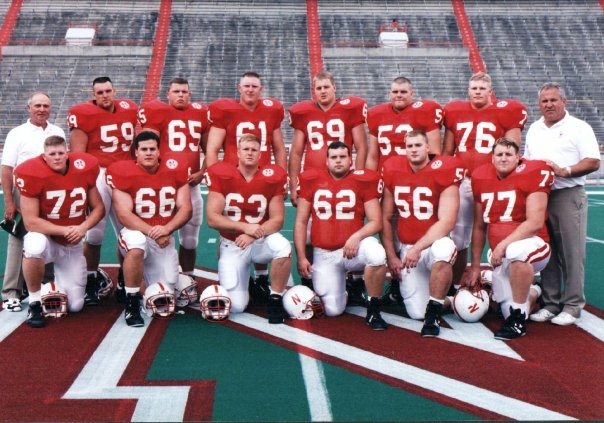
The ’93 edition of the Pipeline
Q: Do you think the coaches used that environment to look for the self-starters, the leaders, instead of lazier guys, the followers?
BP: Well, with that many guys, my opinion was that sometimes the scholarship guys were actually treated a little differently than the walk-ons. You may hear differently from some guys, but that was my experience. They were sometimes treated just a little bit better.
Q: Did you earn a scholarship? And how did you find out, if so?
BP: Yes, ‘94, my senior year. We were getting ready for the bowl game and Coach Osborne came up to me & Brady Caskey and said that unless something changed, they were going to hold two for us guys. And something happened so that they ended up only having one. And I remember Brady said, “You know what, you need it more than I do. I’ll give it to you.” Brady ended up giving his scholarship, his childhood dream, to me. He’s my best friend, lives now in North Platte. We talk a couple times a month. I love him. He’d tear his back off for you.
Q: Do you ever wear your championship rings?
BP: I don’t very much. When I was a Nebraska Trooper I was looked down upon. There were a lot of guys in that organization that were very upset that I was even there. A lot had to do with Lawrence Phillips and Christian Peter and Tyrone Williams, just all those idiots getting in trouble. And the Nebraska State Patrol was really concerned that I was one of those guys. And especially since I was from Chicago, they were concerned I’d bring some of that same kind of attitude into the department, and that was obviously something that you can’t have.
And I find out afterwards -talking to some of the guys who did my background check- I went through their process that first year and they kicked me out after my polygraph test. And it wasn’t because I lied or anything on the polygraph test, it was just that I admitted to being in several fights when I was in college. Obviously, a lot of them were the result of drinking alcohol, which Coach Osborne always talked about not doing. He would always say, “There’s nothing good that happens after drinking alcohol.“ And their impression, when I’d tell them I got into these fights? They felt I didn’t learn from that experience, that I didn’t really have very much remorse for it. That was the reason for bumping me the first time through.
Q: But you persevered…
BP: Absolutely. I went through the process again and I got on. And I’ve gotta say, I poke a lot of fun at Boyd(Epley), but I remember after Florida State, I believe there was a minute-sixteen or so on the clock. Well, in the summertime -every day we had our summer workouts- when we thought we were done or we went through and completed every drill, Boyd and you staff would put an extra 1:16 on the clock and we’d do drills until that last minute-sixteen was finished. It was basically him saying, ”Listen, the game ain’t finished until the clock reads zero.” It was driven home to us.
Q: Do you think any of the guys thought that was hokey or corny?
BP: I don’t recall anybody ever saying that. They really bought into it.
And talking about the years, I remember my first year there that summer, we had about 70 guys who would show up for summer conditioning, but my senior year we had about 150 guys there. There was nobody going home. It was almost expected that you would be there working out. And it wasn’t from the coaching staff, it was from the players.
As far as O-Line goes, I’d say Rob Zatechka, he was kind of the big ring leader on that. Zach Wiegert, he was a clown but he was there at practice. He was clown, but he was there. Brenden Stai, he was another leader of that group.
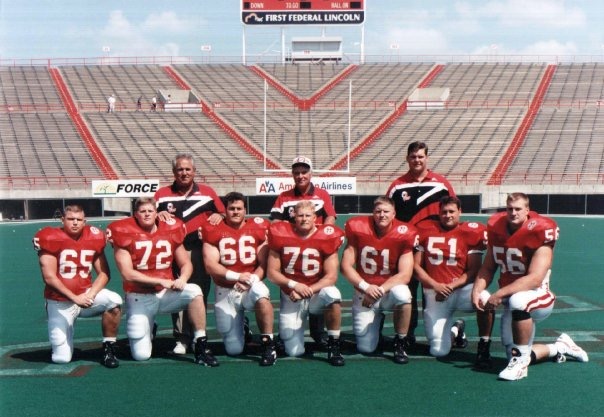
The ’94 Pipeline
Q: If I recall, the strength staff actually reached a point where we decided some of the guys were working too long in the weightroom, so we’d kick everybody out and lock the doors early in the summer evening…
BP: Yeah, they went to Gold’s, and Christian Peter and Jared Tomich and Brendan Stai would all go there and do even more. Looking back on it, I don’t know if they were doing it to get better for Nebraska Football or for the future, but they were pushing hard to get so much better.
Q: You talked earlier about Coach Osborne having 25 goals you wanted to achieve. How often did you achieve those goals?
BP: Right around 15 was the average. One of them, I don’t remember them all, it was something like ‘so many offensive plays over 25 yards’, it might have been five. For Tommie, he wanted 55% completion percentage, and comparing to some other programs, I don’t think it was really that high, (laughs) but for us running the option and what we did that was pretty good.
Q: Did you think those goals were realistic. Did you expect to meet them?
BP: I tell you this, I think everybody bought into everything Coach Osborne said to us. I can’t tell you why, but we did. And a great example goes back to that video of the National Championship game in the locker room at halftime in Miami, where they show him saying, “Hey, you guys are in better shape and all.” And we believed that, because I think we did everything to be in that position.
And my senior year, Coach came in and talked to us after we played Oklahoma and said, “Okay guys, we run the option. I can’t force you guys to do this -and option football is about timing- and we need to practice to keep our timing. I have you scheduled for your first practice on December 17th or we can start earlier, but I’m leaving it up to you guys.” And he left the room. And all the guys voted to continue practicing. I think after the OU game in prior years they’d take a week or two weeks off and then they came back and started practice. He realized that we needed to keep practicing, so all the guys had maybe two or three days off but we were still practicing.
And we were down in Miami before the game getting ready and there were a bunch of pre-game events, and all the guys from Miami were running their mouths (and that was the same thing with the Florida State guys, they were running their mouths). And when we were down there we were practicing like there was no tomorrow. Sure, we wanted to have some fun, too. When we were down there we were practicing hard, but we were seeing the other guys partying and having a great time. They were all so arrogant, thinking they were going to walk all over us. So when he said that, reminded us of that, we knew.
And especially in the middle of the game and we’re playing them and they’re down on one knee and they’re bent over at the waist ‘cause they don’t have any air… and us guys are all, ”Come on, let’s go!” For that game, it was definitely the conditioning thing that Coach talked about and we bought into it. He said it and we knew we did it, did the work. The Florida State game was the fact that nobody gave us any respect, that was a motivator in that game.
Q: What about the field conditions at Miami?
BP: Very sandy. I was a wedge breaker. That’s where I played the bowl games. But yeah, it was a very sandy, very different kind of field. Nothing I don’t think we’d ever seen before. The year before I was on the kickoff and the PAT field goal team. My senior year, I played quite a bit in the first 6 games or so, probably 10 or so snaps a game to give Brenden Stai a break. And then as the games starting getting tighter and it wasn’t as hot anymore Coach wasn’t giving breaks as much anymore.
And I was pissed. I remember one day sitting in team meetings. It was Coach Steele, McBride, up there just chewing the defensive guys’ asses because they didn’t have anybody running down hard on the kickoff team, guys weren’t selling out. And I walked in to see Coach Tenopir and said, ‘Coach, this is my senior year. I’ve gotta play. You gotta get me out there, this is killing me. Can you talk to the coaches about giving me a chance as a wedge-breaker?’ He kinda looked at me like, “You’re nuts, you know that?” He says, “I’ll mention it”, and sure thing he did. So they gave me a shot.
One day we were out there and they didn’t think nothing of it, Coach Steele yells my name and says, ”We’re gonna give you a chance and see what you can do.” This was right before the Missouri game of my senior year. So we get a couple of practices in and they sent me out there on kickoff. And everybody went nuts on the sidelines. The linemen thought it was awesome. All the little guys were jacked up, and first time down… and it’s real simple, the wedge breaker lines up right next to the kicker, Darin Erstad. I think you had R1 and L1, the numbers go out bigger as you go out to the sides. The primary responsibility is breaking the wall.
You don’t even have to tackle, really, it’s just about breaking the wall of guys. It means you gotta haul ass down there and you gotta get around that first block. Those guys are running back ten yards and then trying to take you out. And then when you get past that first wave you’re trying to find that wall -which is usually about 4 guys- and you’re doing everything you can do get down there and try to take out two or three guys with one hit.
You had to sell out, you had to be a little bit crazy, there’s no other way to explain it. You’re running full speed and trying to make a big impact for those guys. Sometimes when you did you stopped the ball-carrier or made them change directions, and then you set them up for some other guys to come in and make a tackle. Cool thing about that, for me, is the Oklahoma game I had two tackles. Blew through the first guy, blew through the second, and lo and behold, I had two tackles. So I had Special Teams Player of the Week for two tackles versus Oklahoma, which was pretty cool.
And I know that Miami game, the first time I got to run down on the kickoff, I don’t even remember who the deep back was, but as soon as he caught the ball he just took off, and I remember thinking, “Holy smokes!” I couldn’t believe how fast the kid was. This wasn’t like a regular Big 8 team, you know? But the thing for me was that I got to get back out on the field. That was important to me.
Q: You could tell a difference in the speed of those guys?
BP: Absolutely. Absolutely. I think with our guys, our group of seniors, we weren’t afraid of anybody. We just had one thing in mind: beat them down and win it. You know? We just knew we were better.
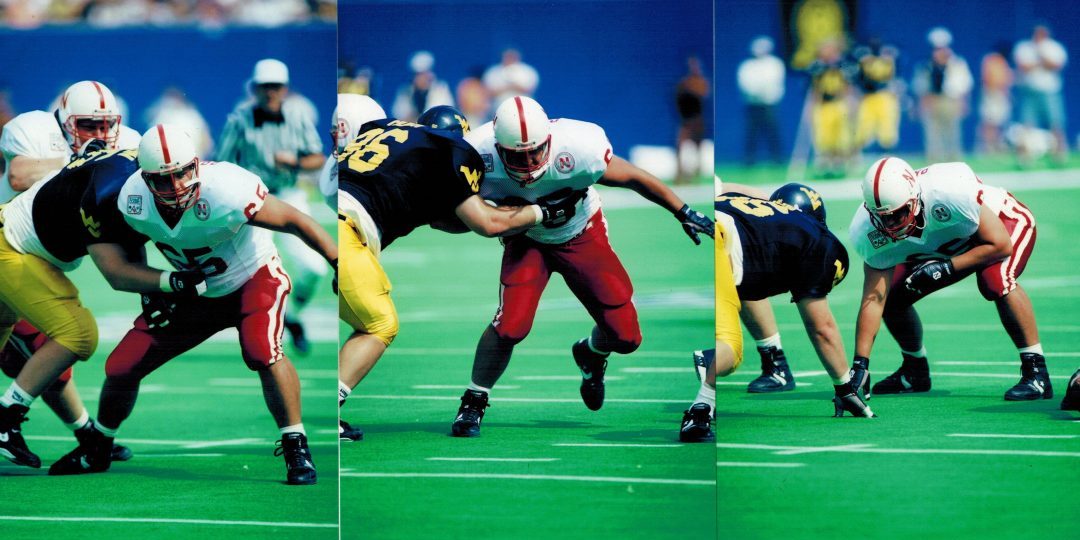
Reaching for that end…
Q: Obviously the other guys wanted to do the same…so how did it end up that we did the beating instead of being the beaten?
BP: That’s a good question. Well, I think through all those years of practices we had a system down. All the repetitions, and the fact that the guys knew how the coaches called the plays, they just felt or knew it was the right combination, you know?
It was definitely a pride thing for the O-line. My senior year, we led the nation in rushing again. We just knew we were going to run them over. And if it wasn’t the first string guys who were doing it, it was the second string guys who would come in and get the job done. I think the offensive line really put the team, offensively, on our backs, and offensively carried the team.
After that Florida State game right away we -almost immediately- we talked about it. We were so close, we had that game. And then they scored right away after that call on Barron out of bounds. And then Tommie hits Trumane Bell -who was also from Chicago- who had a great catch. And then they dump Gatorade on Bowden already. And like I said, Byron, we knew he was at his limit as far as distance.
The funny thing for me was, I remember being out there and then I go straight to thinking, “Oh God, please don’t let me be the guy who jumps offsides!” Because you couldn’t hear anything. You couldn’t have heard 17 fighter jets go over, it was that loud.
Anyway, Zach Wiegert was out there, too, and the Florida State guys were just running their mouths like crazy. They were saying things mostly directed at Coach Osborne, if I recall. Stuff like, “Get the %$&* off the field!” I don’t remember anything else, but Zach was jawing back at them. Zach was the big shit-talker for us, as far as offensive linemen go. And he could back it up, too. I don’t even remember if it was ball placement or time remaining or what the issue was, but they were telling him to get off the field. I remember thinking, “Who the hell are these guys? Nobody talks to Coach like that!” So, like I said, I remember lining up for the ball, couldn’t hear anything, just giving it our best shot…and Byron kicked it left.
Q: You usually played PATs and FG attempts?
BP: The whole year I was. And David Seizys was the holder on that. I couldn’t hear anything. Anything! I just remember thinking to myself, ‘Don’t be the guy who jumps offsides or moves and pushes us back 5 more yards.’ Because you could go down in history. And, unfortunately, Byron has. Because of the field goal.
Q: You know, I wanna get a hold of that guy, because most people forget that 1:15 before that try he nailed a three-pointer. I hope he’s not too scarred from the experience, you know?
BP: If you do talk to him, try to see if he still says the phrase -what was it?- his big phrase was “shit-fire!“
Q: Shit-fire? In what context?
BP: Yeah, obviously, being from Texas, he was a big Texas guy. He always ended a sentence with “shit-fire.” (laughs)
Q: (laughing) Do you have a favorite play or recollection above all others?
BP: I tell you this, probably one of the coolest moments was being in the South end zone in the locker room: the very first time walking into the locker room and walking up to the locker and seeing a jersey hanging there with your name on it.
And some guys, you hear about the tunnel walk and running out onto the field? Well I never even saw those people when I walked out of the tunnel. I never even saw or heard those people when I came out of the tunnel. Maybe it was focus or tunnel vision, I don’t know, but it was never the biggest thing for me. It wasn’t that exciting. It was seeing that jersey with your name on it. Kind of more of like, ‘Alright, I’ve made it. All that work has finally paid off. You’re somebody now.’
Q: What kind of emotions? Was it relief, was it inspiration, getting a tear in your eye?
BP: Probably for me, it was grabbing a jersey and holding it in my hand, looking at it and thinking, ‘I can’t believe I’ve done it.’ Not that you’re done, but it was a first step, the first reality check that, ‘Hey, you’re here. This is for real.’ For me, that was one of the coolest things.
Q: If you had one moment or thing to do over, what would it be?
BP: (Long silence) (laughs) I’m pretty happy the way things turned out. When I came in, I kinda got lost in the shuffle. There were so many guys. They were kinda like, “Hey, if you wanna play offensive line, you can play offensive line.” I only weighed 265 lbs. I should have played another position. Maybe I could have been a linebacker, maybe I should have played fullback. I probably should have thought more of playing in the NFL.
A lot of people ask me, “Why didn’t you play in the NFL or try it?” For me, the goal was just to make it to Nebraska and play college football and make the team. With some of these other guys Nebraska was just a rung in the ladder for their ultimate goal of the NFL. But it wasn’t like that for me, I just wanted to make the team and make it the best I could, and get on the field. And make the traveling squad. It was more of the short term goals. So yeah, thinking back, I would have liked to tried a different position.
Q: You thought you could’ve given Cory Schlesinger a run for his money at fullback, huh?
BP: I think I could’ve. (laughs) I think I could have. I mean, I love Cory, he’s a great guy. (laughs) But it would have been fun.
Q: Any good practice stories?
BP: Let’s see, every Friday we had our 30 minute practice the day before the game. Of course, the linemen, we usually had everything done. There was nothing that we could do, so Coach Tenopir would get the guys and line all the guys up single file and he’d have the guys run pass routes. Even throw the football for ‘em. That was Milt’s big thing, on Friday before the game, was throwing routes for the guys.
Q: No pulled hamstrings or other injuries?
BP: Oh, I’m sure they did, but most of the time it was from laughing at the other guys so hard. Your linemen are linemen not because they’re so big, it’s because they don’t have hands. (laughs) And there were some guys, like the Zach Wiegerts who tried to show off their skills, that was pretty funny.
And of course, some of the fights. I don’t know if you remember the pits, down in the (old North Fieldhouse) pits, that was our home away from home. Osborne didn’t come down there very much, and we didn’t slack off, but that’s where we had our wars: offense versus defensive line, down in the pits. Guys got nasty down there, punching each other.
I got punched in the balls one day. I remember Bill Humphrey, blocked him and knocked him on his ass (this was before he switched over from defensive line to O-line for his senior year). So I knocked Bill down and maybe laid on him or something and stood up and was watching the running backs, and the next thing you know I’m just bent over at the knees ‘cause Bill punched me in the balls. I’m like, ‘Who does that to another guy?!’ (laughs) All those stories about Christian Peter, some of those guys spitting, I don’t know if you remember that quarterback from Kansas State?
Q: Chad May?
BP: Chad May! All those stories about our guys punching him in the balls, spitting in his face, gouging him in the eyes? All true! But of course, Coach Osborne never knew about all that stuff. He would have been furious if he found out that type of stuff was going on.
Q: How do you think he never knew?
BP: I don’t know. I’m not real sure! Quick football story: I was a dirty offensive lineman. I was basically a defensive lineman playing offensive line.
I hate to say this without really saying it -and I hate to sugarcoat it- but we could get pretty dirty. For offensive linemen, we’d ‘cut’ like crazy, we blew guys’ knees out and ankles all the time. One play we’re doing an 18 Option, I was out there working with Brady Caskey. It was against Colorado State, I believe, and the tackle’s gonna try to get off the guy and the guard is going to pick him up, a technique called ‘pull and overtake.’ So we’re basically working 2 on 1 on the option, so Brady reaches his guy and he takes off for the linebacker (there was a technique you could use if you planted your helmet down on the other side of the guy’s foot, and then you plant your shoulder down on the guy’s foot you could tear his ankle or knee out).
And, of course, I did that because he had no idea I was coming, and the guy’s holding his knee. And I remember we were 20 yards downfield and Brady said, “Did you get the guy?” I turned to him and said, ‘He’s laying back there.’ Of course, they carted him off. And it’s terrible to say, but we got pretty nasty.
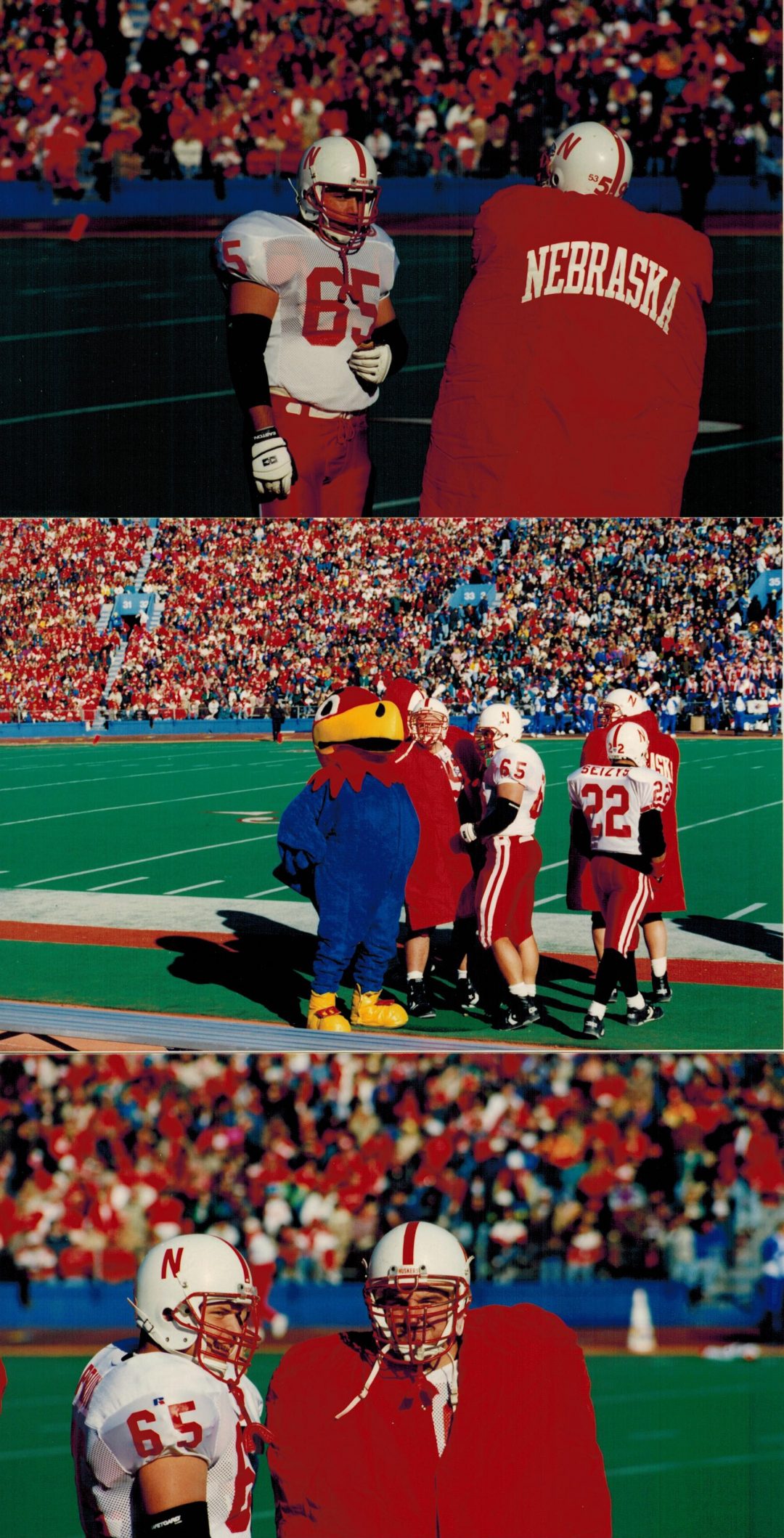
Q: Any remorse for something like that happening?
BP: No, it was just part of it. That’s the way we were taught. It would happen. We got down low on the guys, that’s the way we did business. Not that guys were afraid to play us, but they were very emotional playing against us. They, the defensive linemen, didn’t like us going down low.
But that’s part of what made us pretty good, was that fear that we would mix things up. That was important to our success. They were pissed, yelling at the refs, yelling at us, calling us cheap, you name it. They just hated it. They were just verbally upset. Of course, they’d try to get their shots in when they could. But you’re wearing pads, so it never really did anything.
To be continued…..
Copyright @ 2013 Thermopylae Press. All Rights Reserved.
Photo Credits : Unknown Original Sources/Updates Welcomed
Paul Koch